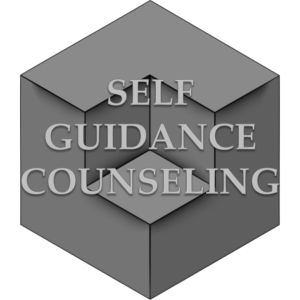
For the past three years I have been working on a system to help me keep track of my life.
It began as a way to hold myself more accountable, especially when it came to the things that were intrinsically important to me but were not necessarily urgent or time sensitive. I had already tried setting alarms, keeping a journal, using an accountability buddy, making lists; nothing seemed to work long-term. I would make some progress, but then something would come up. Distracted or preoccupied, I’d go back to old habits, losing whatever progress I had made. I was stuck at square one—treading water, but not making any meaningful progress forward.
The end of 2016 was a particularly hard time for me. I was dealing with a combination of chronic injury, depression, and anxiety. Just getting out of bed was a challenge most days; the thought of applying myself productively towards a long-term goal seemed impossibly out of reach. At my lowest point, I was in so much pain and on so much medication, I could barely manage to stand up even once an hour to minimize muscle atrophy.
Coming from that place, as I got better I was determined to make some meaningful changes. I knew I needed a new approach–a system to keep myself motivated, even on the days when getting out of bed was difficult. I figured that if I could come up with a fun way of keeping “score” of how often I accomplished something—basically, if I could make a game out of it—I would be more mindful of my habits and consistent with my activities. Three specific activities I wanted to focus on were: meditating, physical therapy, and creative writing. Each of these was important to me for different reasons, but without a meaningful arbiter or system of accountability, motivating myself to do them continued to be a daily struggle.
I knew I wanted a system that had both a proactive and a reflective element to it–something that would allow me to quantify both what I wanted or needed to do beforehand and also what I ultimately did do. I started with meditating and I kept it simple: for every five minutes I meditated during the week, I would make a tally mark on a sticky note. At the end of every week I would add up the tally marks to get a total score.
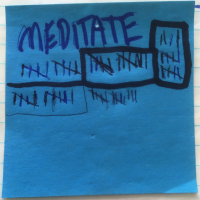
I tried this method for five weeks, but I quickly realized that a static daily—or even weekly—score for one or two activities was not what I was looking for. What I really wanted was a way to see the dynamic interactions and accumulation of behaviors across multiple domains of my life; to see where I was investing my time and effort, and how those efforts added up over time. Much as we keep track of an athlete’s performance using objective measurements such as “On-Base Percentage” and “Yards From Scrimmage,” I wanted to be able to look back and see for myself: how many days this week did I “get on base?” How many “total yards” have I accumulated this month? I thought that if I could somehow measure and record my “daily performance” quantitatively, I would be more motivated, and therefore more likely, to accomplish the things in my life that no one else was going to do for me
2017 was a year of starts and stops as I struggled to determine my next steps in life while dealing with successive relapses of my back injury. I continued to learn about and experiment with other methods of tracking my daily performance, but still hadn’t found exactly what I was looking for.
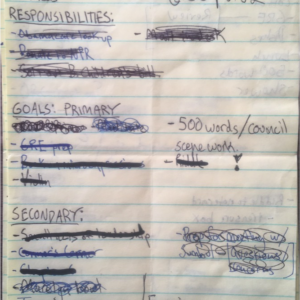
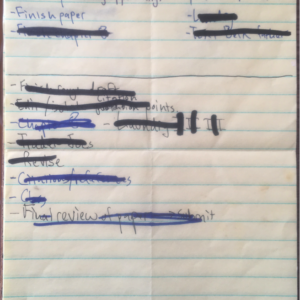
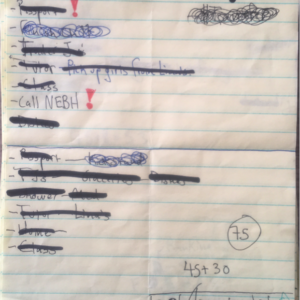
Towards the end of 2017, I was taking some exploratory graduate courses at Harvard Extension, when I signed up for a class called the Science of Coaching Psychology. Five minutes into the first class in January, something clicked. The course exposed me to an interdisciplinary model of wellness that was unlike anything I had seen before. Much of the material centered around the burgeoning fields of coaching and applied positive psychology, but it also drew on concepts from a range of subjects like biochemistry and philosophy. It was a true left-brain meets right-brain approach, dancing from neurology to Nietzsche without missing a beat.
By the end of the first day, I knew I needed to find a way to incorporate the scientific and humanistic principles laid out within these fields into the structure of my system. More than that, if I expanded my approach and worked to create a framework that was not personalized to fit my needs but universalized and flexible enough to work with a general audience, there was a chance I could make a system that helped other people, too.
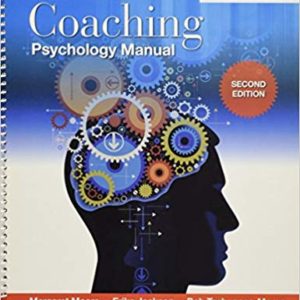
After completing the course, I went on to get my certification as a health and wellness coach (CHWC) through the organization whose training manual had served as the class textbook. I continued to do exhaustive research into different fields like psychology, neuroscience, and philosophy—integrating as much as I could into my system, which by this point had taken on a life of its own. What began as a way to motivate me to meditate, had evolved into something else entirely. I was looking to build a compass for my life.
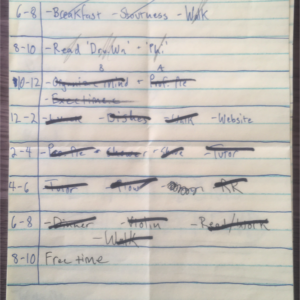
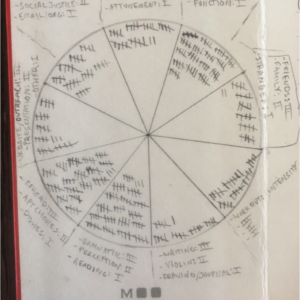
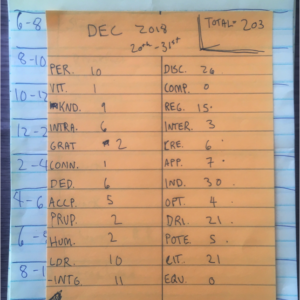
Through much trial and error, by December of 2018, I reached a point where I was comfortable with a rough draft of my system. I still had a long way to go to refine it, but nonetheless, I began 2019 prepared to use this system to track my “performance” for the upcoming year.
After 11 months, here’s some of what I am able to report.
In terms of quantifiably tracking my daily activities:
-328 days: Stretching/physical therapy (missed 6 days)
-247 days: Meditated (approximate total of 41 hours)
-196 days: Engaged in a creative activity
-276 days: Worked on something I was interested in or curious about
-205 days: Worked on something business or money related
-80 days: Strength building exercise
-126 days: Went on a walk
-68 days: Practiced violin
-70 days: Spent time with friends
…
Additionally, I also recorded at least:
-652 times that I made a mistake or didn’t live up to my own expectations
-902 times that I took a moment to express gratitude for something
-994 times I took a moment to appreciate nature or enjoy a sensory experience
-519 times I felt momentarily overwhelmed by anxiety
-589 times I felt optimistic or hopeful about the future
-218 times I experienced a moment of flow or optimal experience
…
Tracking how I spent my time and energy each day, doing activities such as those above, I totaled:
-Cognitive/Intellectual activities: 5,437 points
-Intrinsic: 2,804 points
-Extrinsic: 2,633 points
-Physical/Behavioral activities: 4,766 points
-Individual: 2,562 points
-Collective: 2,204 points
-Social/Emotional activities: 5,023 points
-Self: 2,782 points
-Other: 2,241 points
…
On 221 days I set at least one specific behavioral goal.
Some longer-term goals I completed during these 11 months were:
-Started a business
-Formed an LLC
-Built a website
-Got married!
-Traveled to another country (Austria)
-Compiled character progression system
-Outlined functional capacities
-New draft of VM model
-Finished 52 books
-Filled 3+ notebooks
-Found my “path”
…
For setting and completing goals like those above, I earned a total of 18,080 points.
But reality is far from a spreadsheet. A quantitative measurement is just a tool—a means to an end; here, to help me improve the subjective quality of my life.
As for qualitatively measuring this year, I can say without a doubt that this has been the year of my life where I have felt the most in control of my destiny—like I was holding the pen to my own story. I was more intentional with my time and deliberate with my attention than at any other point in my life. I moved the needle, so to speak, and I feel more connected to myself and the world than ever before.
I can also say that I am not where I want to be in a lot of areas. I wasn’t able to do everything I set out or wanted to do—far from it—but now I have some specific benchmarks to overcome and a clearer way to keep track of my progress. I gained invaluable insight into myself and I cant wait to do better next year.
I want to stress that I’m not sharing any of this to gloat or make it seem like I’ve done something extraordinary. The truth is that I wouldn’t have been able to do any of this if it weren’t for the help and support I received from many along the way—not just when I was at my lowest, but throughout my life. I’ve had so many opportunities that others do not: opportunities to make mistakes, to fail, to try new things, to explore the world, to think about my future. When I started working on this system three years ago, the last thing I expected was that I would make any of it public. All I set out to do was create some private goals and victories for myself. But the deeper I got, the more I realized how valuable this approach could be for others, too.
It’s hard to recognize when you need help, and even harder to reach out for it. For me, when that point came back in 2016, I was fortunate enough to get the help I needed.
We all can use a hand getting better at something. As a self-guidance counselor, I can be that hand. Heading into 2020, if you’re thinking about making some simple or serious changes to your life or setting some actionable goals for the months and years to come, check out my website at selfguidancecounseling.com and please consider reaching out to me. I can help you organize and keep track of your daily habits and long-term goals using the system that I’ve created, or we can collaborate over your strengths and interests to identify what’s meaningful in your life.
P.S. New Year’s Resolutions usually don’t work